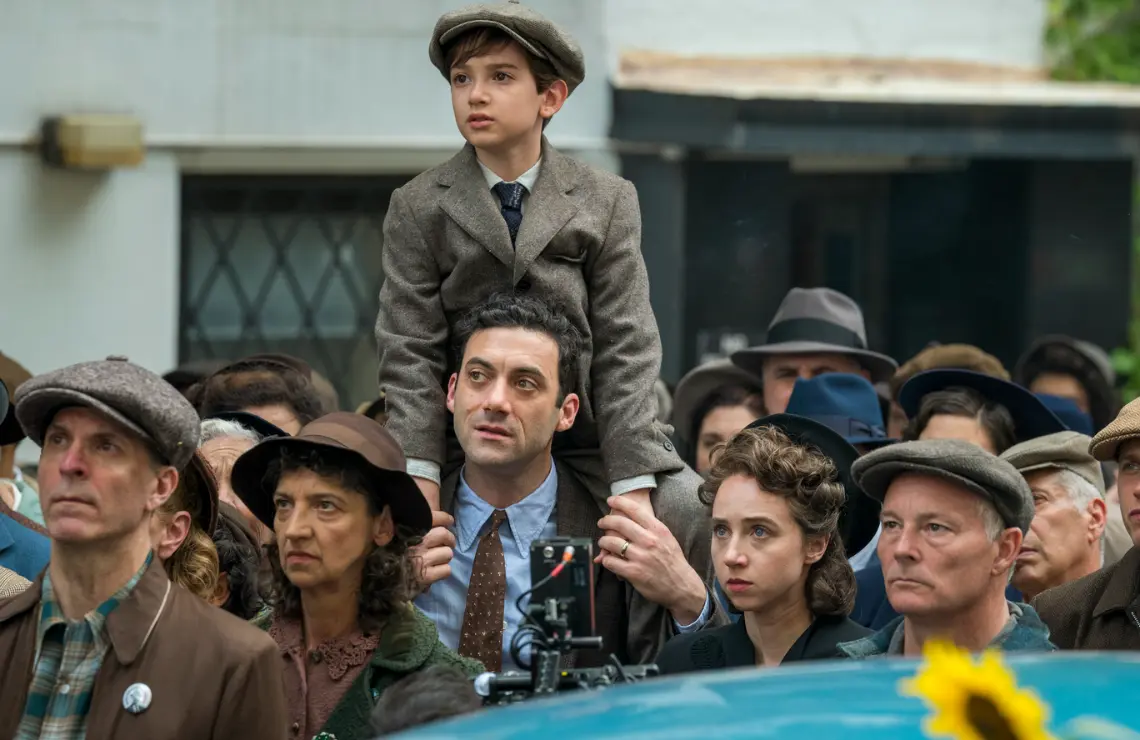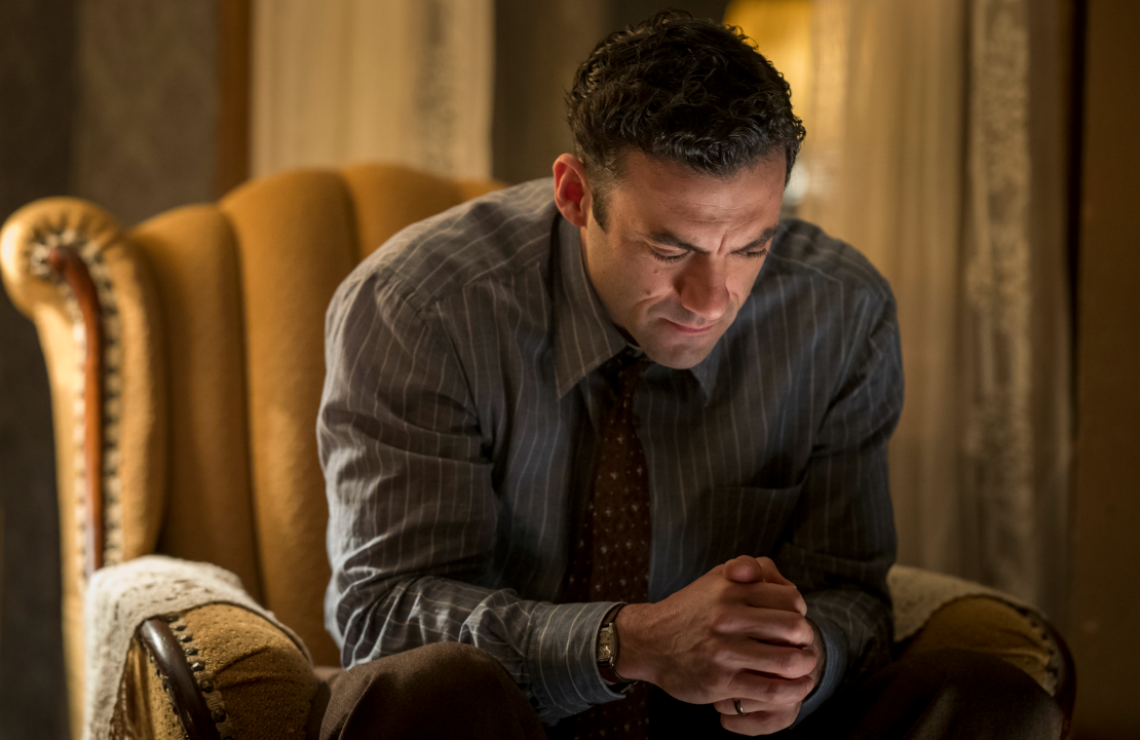Breaking Down The Plot Against America Finale
-
 Azhy Robertson, Morgan Spector, and Zoe Kazan in The Plot Against America. (HBO)
Azhy Robertson, Morgan Spector, and Zoe Kazan in The Plot Against America. (HBO)Spoiler alert: This post contains major story details from The Plot Against America.
Adapting a work of fiction as legendary as Philip Roth's 2004 novel The Plot Against America for TV has to be daunting task. Stick to the script too closely, and its story may not resonate on screen. Take too many liberties, and risk alienating much of its core audience.
For their HBO adaptation, series creators David Simon (The Wire) and Ed Burns (Generation Kill) have fleshed a few characters and expanded the story's scope in some interesting ways, but they've largely stuck to the timeline and events depicted in the source material. That is, until Monday night's sixth and final episode, which in one fell swoop addressed criticism of the book's original ending and contemporized its story to this exact moment in time.

The finale picks up where last week’s penultimate episode left off, with anti-semitism continuing to grow throughout the country. Things reach a tipping point when Walter Winchell — one of the rare public voices to continue to speak out against Lindbergh’s actions and policies — is murdered at one of his own presidential campaign events. That sets off an unforeseen chain of events, as a large group of citizens begins to demand that Lindbergh finally address the violent anti-Semitic acts that are being carried in his name.
Those demands prompt the president to fly to Louisville, Kentucky, where he gives a short and unsatisfactory non-response, before beginning his return trip to Washington. From there, in one of the show’s more surprising additions, we see Alvin (Anthony Boyle) take part in a British-Canadian plan to bring down Lindbergh’s plane — a plot that seems to succeed, as the president is reported missing the following morning.
Lindbergh’s disappearance is one of the moments in Roth’s novel that seems to come out of nowhere. By including Alvin in the plot against Lindbergh, the show makes the president’s disappearance feel far more organic.
When Lindbergh’s anti-Semitic VP, Burton K. Wheeler, assumes the presidency, he quickly enacts Martial Law. As he and the Secretary of the Interior, Henry Ford, espouse theories of a Jewish conspiracy, Lindbergh’s followers predictably blame his disappearance on the Jewish people, and begin lashing out publicly and violently, without their so-called leader around to tell them to stop. (Not that Lindbergh would have anyway.)

The finale’s reaches its boiling point during Herman and Sandy’s (Caleb Malis) trip down to Kentucky to their former neighbor Seldon Wishnow (Jacob Laval), following the KKK’s murder of his mother. Not seen in the novel, the entire sequence brims with tension, as Herman desperately tries to make his way to Kentucky and back to New Jersey, while attempting to evade notice of the many anti-semites and Klan members he encounters along the way.
The sequence is capped by one of its most touching moments, when Herman and Sandy take a pit stop on the way home and begrudgingly eat bologna sandwiches (with mayo). In a show that deals so heavily with pain and division, it’s a surprisingly touching scene of healing and unity between father and son, and it offers viewers a much-needed moment of warmth in what is an otherwise overwhelmingly somber and frightening episode.
From there, the series returns to the path laid out in Roth’s novel. Rabbi Bengelsdorf (John Turturro) is arrested by the FBI under suspicion of treachery, which leads Evelyn (Winona Ryder) to ask Bess (Zoe Kazan) for shelter from the authorities she’s sure will be coming for her. Evelyn’s pleading is, of course, to no avail. She may always love her, Bess tells Evelyn in their final scene together, but she’ll never forgive her.
A short time after Herman and Sandy's return, Lindbergh’s wife is rescued from her unlawful psychiatric hold, and uses her freedom to send out a message to the public. In it, she calls for peace in the nation, for the acting president to be removed from power, and for an emergency presidential election to be held to determine a proper replacement for her husband. In the moment, her public address seems to be the clearest indicator yet that the series is heading toward the same conclusion as the novel. Simon and Burns, however, clearly have other plans, as the final ten minutes feature some of the biggest swerves away from the source material.

The changes begin with the tumultuous dinner between the Levins, Alvin, and his new bride-to-be, Minna (Keilly McQuail), which begins rather peacefully but concludes with Herman and Alvin getting into a bloody and wholly unnecessary brawl in Herman’s home. The scene itself is taken almost exactly from Roth’s novel — with one key difference, in the book, it occurs prior to Lindbergh’s disappearance, which makes the fight feel mostly like it's about Herman and Alvin taking the tension of the moment out on each other. By placing the scene later in the series, after Lindbergh’s disappearance and heading into the emergency election, Simon and Burns end up casting the fight in a much different light. You may think the worst is over, the series seems to say, but the trauma of Lindbergh’s presidency has changed relationships in ways that may never be reconciled.
The scene's nihilistic, chilling feel makes it the perfect lead-in to the final montage, as we watch Herman and thousands of other Americans cast their votes on election day. Most of them are presumably voting to re-elect Franklin D. Roosevelt. In the novel, Roosevelt handily wins the election, and is in office when Japan attacks Pearl Harbor, which leads to the U.S. entering the war and history unfolding more or less the way it did in real life. Simon and Burns’ version ends in a much less conclusive fashion.
Rather than ending on images of Roosevelt back in office and everything returning to normal, the final election day sequence is filled with moments of voter suppression and of ballots being burned. All of which builds to the series’ final image, of Herman and Bess and the rest of the Levins sitting around the radio, nervously awaiting the election results. They are, of course, not just waiting to find out who is president, but to see if someone will finally be able to put an end to the madness. But the miniseries stops short of giving us the book's happy ending, leaving us instead with the chaotic election images hanging fresh in our minds, unsure there can be such a thing as a “happy ending” when there are those looking to manipulate something as fragile and pure as democracy for their own personal gain.
By concluding the series on this uncertain moment, Simon and Burns have faithfully adapted Roth’s novel, while making its story feel even more relevant to the turbulent and divisive political times we find ourselves in today. As the series not so subtly remind us, 2020 is an election year, after all.
People are talking about The Plot Against America in our forums. Join the conversation.
Alex Welch has written about television and film for TV by the Numbers, IGN, The Berrics, Paste Magazine, Screen Rant and GeekNation. Follow him on Twitter @alexrwelch.
TOPICS: The Plot Against America, HBO, Anthony Boyle, David Simon, John Turturro, Morgan Spector, Philip Roth, Winona Ryder, Zoe Kazan